Choosing Between Private and School-Based Speech Therapy
Understanding the Choices in Speech Therapy
When children need speech therapy, parents often face the decision between private and school-based services. Each option offers unique benefits tailored to different needs, goals, and circumstances. This article breaks down the differences and considerations to help families make informed decisions that best support their child’s communication development.
Key Facts List: School-Based vs Private Speech Therapy
- School-based speech therapy is provided within the educational system by a school-employed SLP, focusing on academic success.
- Private speech therapy is delivered outside school in clinics, homes, or private environments, offering more personalized and flexible sessions.
- Eligibility for school services depends on demonstrating that speech issues hinder learning, while private therapy has fewer restrictions.
- School services are scheduled during school hours and often involve group sessions, whereas private therapy can be scheduled outside school hours with one-on-one attention.
- School-based services operate under federal laws like IDEA, with goals aligned to educational objectives, while private therapists are more flexible without such legal restrictions.
- Parents typically have limited involvement in school-based therapy but actively participate in private sessions by coaching and home practice.
- School services are free but limited by caseloads and session duration, while private therapy involves out-of-pocket costs but offers more intensive support.
- Both approaches can be combined for a comprehensive support system, emphasizing the importance of coordination and personalized goals.
- Private therapy often addresses a broader range of issues, like medical conditions, which may not be the focus in school-based services.
- Choosing between the two depends on eligibility, goals, cost, scheduling, and the child’s specific needs.
1. School-Based Speech Therapy: Education-Focused Support
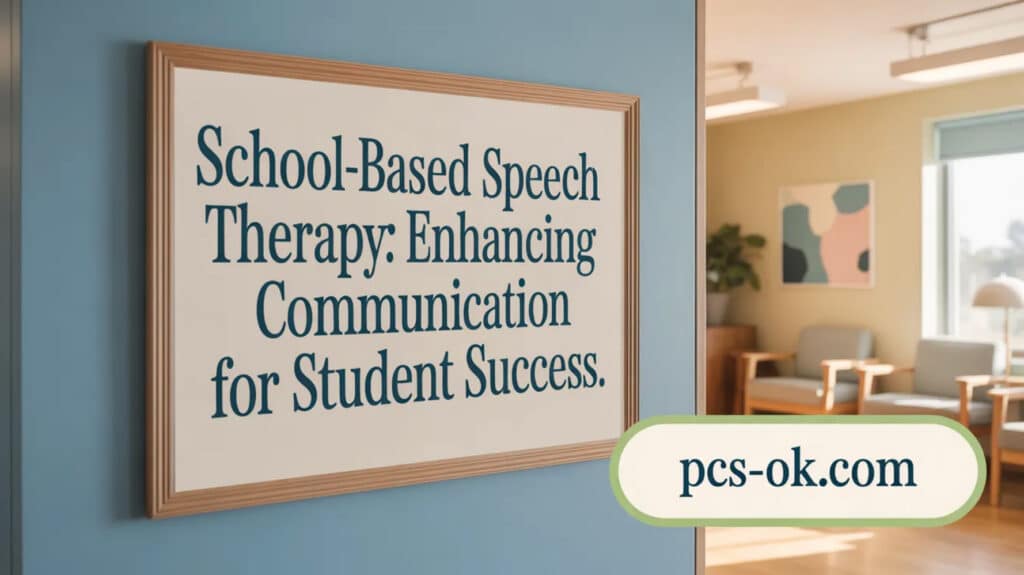
What are the main differences between private speech therapy and school-based speech therapy?
School-based speech therapy is provided within the educational system, usually by a speech-language pathologist employed by the school district. It primarily focuses on helping children improve communication skills that directly influence their academic success, such as listening comprehension and expressive language.
In contrast, private speech therapy is delivered outside of the school environment, often in clinics or private practices, and is more flexible and personalized. Private therapists can treat a broader range of speech and language issues, including those not directly impacting school performance, and sessions are tailored to the child’s specific needs.
Eligibility criteria differ significantly. To qualify for school-based services, children must demonstrate that their speech or language challenges hinder their ability to learn. This involves a multi-step evaluation process, including screenings, formal assessments, and review of work samples, to determine if the child’s difficulties meet the criteria outlined by laws like IDEA.
Unlike private therapy, which can be accessed independently and at the family’s discretion, school-based services are limited to children who meet specific eligibility thresholds and usually require parental consent and participation in the Individualized Education Plan (IEP) process.
Eligibility criteria and evaluation process
In schools, students must meet certain criteria, such as scoring at least 1.5 standard deviations below the mean on standardized speech and language tests, and their communication issues must impede their learning. The process involves screening, detailed evaluations, and reviewing the child’s academic and behavioral performance.
Private therapists, however, have fewer restrictions and can start therapy based on a child’s individual needs, which may include milder delays or issues not impacting school performance.
Integration with academic goals
School services are designed to align with educational objectives. Goals are set based on IEPs, focusing on skills that support classroom success, like following directions or participating in discussions.
Private therapy goals are individualized based on assessments, often reflecting broader communication challenges, and may not necessarily connect directly to the school curriculum.
Therapy setting and scheduling within the school day
Services are scheduled during school hours, often in small groups or individual setups within the classroom or designated therapy space. Sessions are usually shorter and less frequent, dictated by the IEP.
Private therapy sessions are scheduled flexibly outside school hours, in environments like clinics, homes, or other locations, allowing for longer, more intensive, and tailored sessions.
Group versus individual therapy sessions
School programs often deliver therapy in group settings to serve multiple students simultaneously, which can limit personalized attention but promote peer interaction.
Private therapy can be conducted one-on-one or in small groups, focusing intensely on the child’s specific speech and language goals.
Service provision under IDEA and school regulations
School-based services operate under federal regulations such as IDEA, which stipulates eligibility, individualized planning, and service delivery standards. This ensures that children with qualifying disabilities receive support tailored to their educational needs.
In private practice, therapists are not bound by these laws, granting them greater flexibility to customize therapy approaches and target a wider array of disorders.
Focus on communication impacting educational performance
The primary criterion for eligibility in schools is that the speech or language disorder adversely affects learning or classroom participation. If issues do not interfere with academics, children may not qualify for services.
Private therapy can address problems regardless of their impact on school performance, offering assistance for issues like severe speech disorders, social communication difficulties, or medical conditions.
Collaboration among educators, therapists, and parents
Effective school-based speech therapy involves collaboration among teachers, therapists, and parents. Parents can receive updates and communicate with school therapists, but their involvement is generally limited.
In private therapy, parents usually play a larger role, with active participation in sessions, coaching at home, and ongoing feedback.
Cost-effectiveness and accessibility
School services are provided at no additional cost, making them accessible to all qualifying students. However, large class sizes and limited session durations can affect the level of individual support.
Private therapy is typically paid out-of-pocket or through insurance, which can be costly, but offers more personalized and intensive intervention.
Limitations such as caseload size and therapy intensity
School-based SLPs often manage large caseloads—sometimes over 60 students—limiting the amount of individual attention each child receives. This can affect therapy frequency and depth.
Private therapists usually serve fewer clients simultaneously, enabling more frequent, customized, and intensive sessions, which may accelerate progress.
| Aspect | School-Based Speech Therapy | Private Speech Therapy | Additional Details |
|---|---|---|---|
| Eligibility | Must meet specific educational criteria | Based on individual needs | Schools require assessments and criteria compliance |
| Focus | Academic success and classroom skills | Broad, including medical issues | Goals tailored to educational or personal needs |
| Setting | School, in groups or individually | Clinics, home, or other environments | Flexible environments for private therapy |
| Cost | No extra cost, funded by school | Paid by families, insurance | Cost can be a barrier for private services |
| Caseload | Large, often over 60 | Smaller, fewer clients | Caseload impacts available session time |
| Parental Involvement | Limited, updates provided | Active, ongoing participation | Private allows more direct involvement |
| Therapy Goals | Aligned with curriculum | Based on comprehensive assessment | Private goals may extend beyond academics |
| Regulation | Federal laws like IDEA | No specific legal restrictions | Regulation ensures eligibility but limits scope |
| Limitations | Less individual attention, group setting | More personalized, intensive | Both have unique strengths and challenges |
This comparison highlights how both models serve different needs and preferences, allowing families to choose based on their child’s specific requirements and circumstances.
2. Private Speech Therapy: Personalized and Flexible Intervention
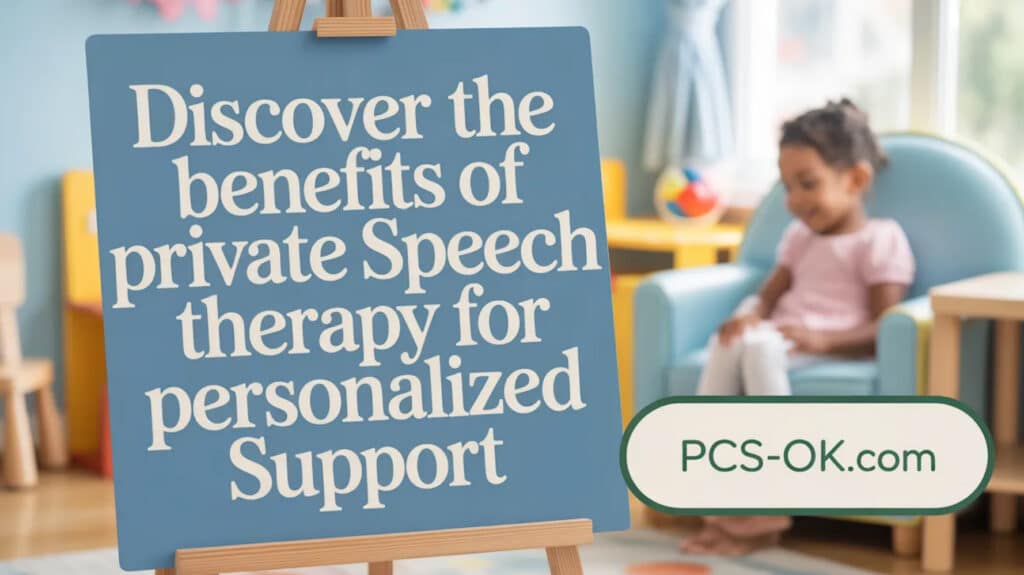
What benefits does private speech therapy offer compared to school-based speech therapy?
Private speech therapy provides a highly personalized approach that is tailored to each child’s unique communication needs. Unlike school-based services, which require children to meet specific eligibility criteria—such as scoring at least 1.5 standard deviations below the mean on standardized tests—private therapy is accessible to children with a broader range of challenges, including milder delays. This flexibility allows children to begin therapy earlier or address issues that might fall outside school eligibility.
One of the main advantages of private therapy is the emphasis on one-on-one sessions. This setup ensures that each child receives focused, intensive intervention, which can lead to faster progress. Parents are actively involved in private sessions, receiving coaching on techniques to reinforce learning at home, fostering a supportive environment for generalization of skills.
Scheduling is another benefit. Private therapists can offer appointments outside traditional school hours, including evenings and weekends. This flexibility helps families maintain consistent therapy routines and continue intervention during school breaks, avoiding gaps that could slow progress.
Private practices often treat a wider array of speech and language issues, including medical conditions such as feeding disorders or specific speech disturbances like Childhood Apraxia of Speech (CAS). Therapists are trained to utilize specialized techniques and may work in diverse environments—such as clinics, homes, or even outdoor settings—to optimize the child’s engagement.
While private therapy can be more costly—sometimes involving multiple weekly sessions—it often accepts insurance or offers reduced rates, making it accessible to many families. The higher intensity and personalization can be particularly beneficial for children who do not make sufficient gains in school-based services or who require a more focused and continuous approach.
In essence, private speech therapy complements or sometimes replaces school-based services. It offers tailored, intensive treatment options that address a wider spectrum of needs, providing children with more opportunities for progress in a supportive, flexible setting.
Key Differences Between Private and School-Based Speech Therapy
What are the main differences between private speech therapy and school-based speech therapy?
Private speech therapy is carried out by licensed therapists outside of the formal school setting. It offers tailored, one-on-one sessions that can be scheduled conveniently and extended during school breaks, providing intensive treatment for a variety of speech and language challenges. Parents often participate actively, receiving coaching and homework to support their child’s progress. The focus is highly individualized, often addressing medical or specific disorder issues such as Childhood Apraxia of Speech (CAS).
In contrast, school-based speech therapy takes place within the educational system, typically delivered by a school-employed speech-language pathologist (SLP). To qualify, children must demonstrate that their speech or language difficulties negatively impact their classroom learning. Services are usually provided during school hours, either individually or in small groups, focusing on educational goals related to listening comprehension, expressive language, and literacy skills.
Setting, eligibility, and focus differences
The environments differ significantly. Private therapy occurs outside school, offering more flexibility in location and session structure. It treats a broader spectrum of disorders, including those not directly related to academic performance. Eligibility in schools is based on strict assessments showing that the child’s speech challenges interfere with their educational success, adhering to federal regulations under IDEA.
Goals in school settings are aligned with curriculum needs, often streamlined through an Individualized Education Plan (IEP), while private therapy goals are tailored based on comprehensive assessments of the child’s overall language abilities, not confined to educational criteria.
| Aspect | Private Speech Therapy | School-Based Speech Therapy | Additional Details |
|---|---|---|---|
| Location | Clinics, private offices, home, or specialized environments | School classrooms, clinics within schools, or separate settings | Often within the school during the day or in sessions sponsored by the school |
| Eligibility | No strict eligibility; based on need and parental decision | Must meet criteria demonstrating impact on school performance | Determined through evaluations, IEP reviews, and work samples |
| Focus | Medical, functional, and educational aspects; broader range | Educational and academic success; limited to school-related issues | May include specialized treatments like PROMPT or NLA |
| Parent Involvement | High; active coaching and homework assignments | Limited; updates and communication through the school system | Private therapy allows more control over involvement |
| Scheduling | Flexible, outside of school hours; can be more frequent and intensive | During school hours; aligned with IEP targets and resources | Private sessions can be scheduled at parents’ convenience |
| Cost | Usually paid out-of-pocket, insurance may cover some costs | Typically free or covered by the school district | Private therapy may involve costs but offers tailored services |
Parent involvement and therapy intensity
Parents involved in private therapy play an active role, often participating in coaching to carry over skills at home. Sessions may be more frequent and personalized. Conversely, in school, parents receive updates but have less direct contact with the therapist during the school day. Private therapy aims to address a wide array of needs, sometimes providing more targeted and intensive intervention.
Scheduling and cost considerations
Scheduling in private practices allows flexibility, accommodating family routines, and can include sessions outside school hours or during breaks. This consistency supports ongoing progress, especially when combined with school services.
While private therapy often involves significant out-of-pocket expenses, many providers accept insurance or offer reduced rates. School-based services are generally free, funded through public resources, but may be limited by larger caseloads and less flexibility.
| Aspect | Private Speech Therapy | School-Based Speech Therapy | Additional Details |
|---|---|---|---|
| Scheduling | Flexible, outside school hours, or during breaks | During school hours, aligned with school schedule | Private offers more parental control over scheduling |
| Cost | Out-of-pocket, insurance options, or reduced rates | Free or covered by the school district | Private may be costly but more personalized |
| Therapy Intensity | Can be higher with more frequent sessions | Usually less frequent, constrained by school resources | Private therapy can be more comprehensive and tailored |
Both approaches can be complementary, and many families choose a combination of services to best meet their child’s unique needs. Private therapy often bridges gaps that school-based services cannot fully address, especially when issues extend outside academic-related speech and language development.
Factors to Consider When Choosing Speech Therapy Type
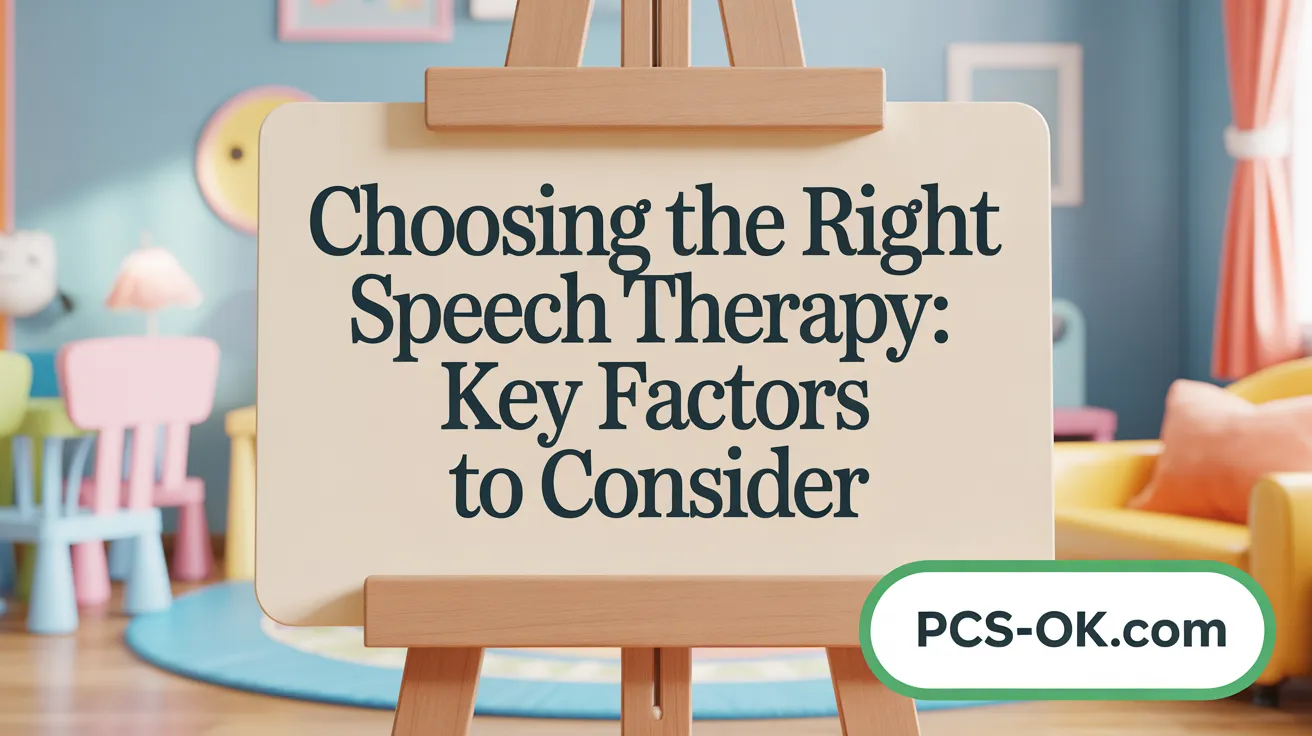
What factors should parents consider when deciding between private speech therapy and school-based speech therapy for their child?
Parents need to evaluate several aspects to determine the most suitable therapy option. First, eligibility is essential; school-based speech therapy requires children to meet specific criteria, such as demonstrating that their speech or language challenges impact their academic success. If a child’s difficulties do not interfere with classroom performance, they may not qualify for school services.
In contrast, private speech therapy does not have strict eligibility requirements. This openness allows children with milder delays or those who fall outside school criteria to access personalized intervention early.
Next, consider the setting and delivery of therapy. School-based services are typically provided during the school day, often in group settings or within classrooms, with sessions aligned to an IEP. These are generally shorter and less frequent but integrated into the educational environment.
Private sessions are scheduled at convenient times for families, often outside school hours, and can be tailored to individual needs. They typically involve one-on-one work, with active parent involvement, such as coaching on techniques to practice at home. Continued sessions during school breaks help maintain progress.
Cost and scheduling are significant factors. School-based therapy is usually free or included in special education services, but availability and caseloads may limit individual attention. Private therapy entails out-of-pocket expenses, which can vary but often include insurance options or sliding scale rates, offering more scheduling flexibility.
Parents should also consider the potential for combining both approaches. Some opt for a blend of private and school-based services to provide a comprehensive support system, addressing educational and medical needs.
In making a decision, families should reflect on their child’s specific speech and language challenges, the level of individual attention required, and their own preferences regarding involvement, cost, and scheduling flexibility. Consulting with professionals can also guide parents toward the best approach to support their child’s development effectively.
Differences in Therapy Goals and Treatment Approaches
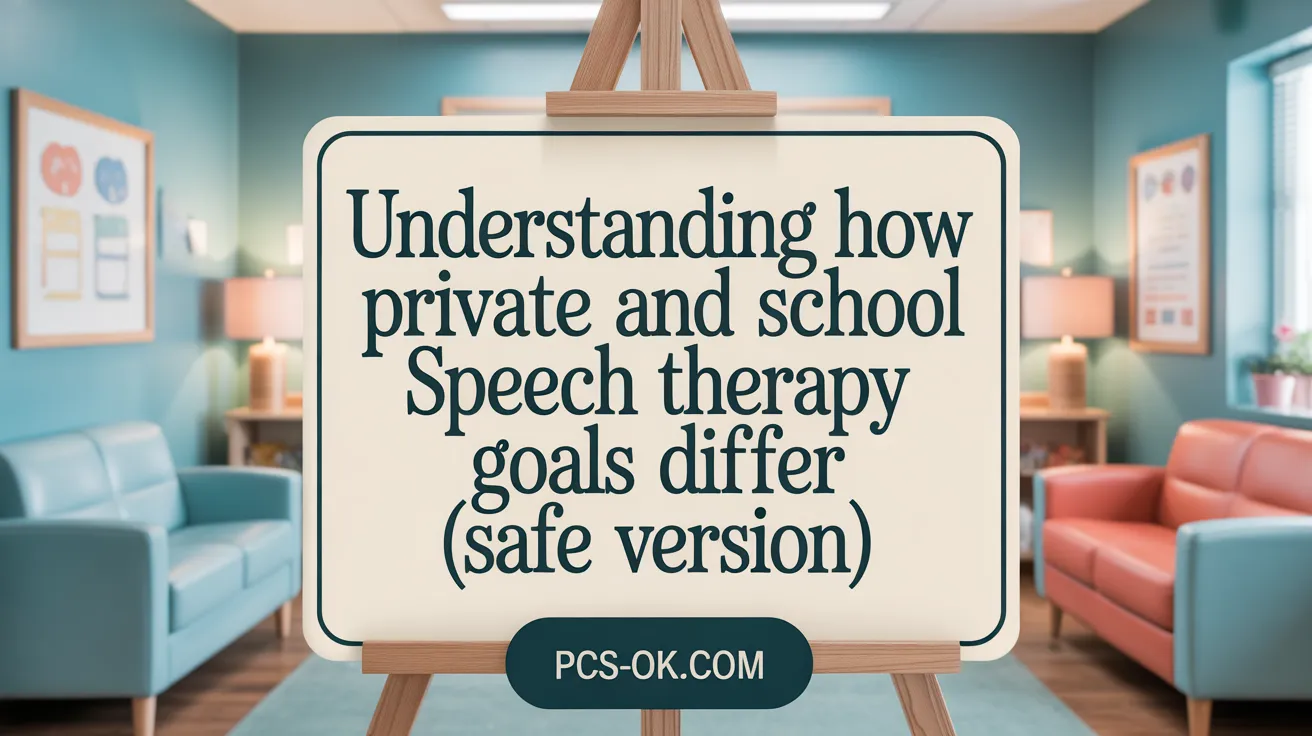
How do the goals and treatment approaches differ between private and school-based speech therapy?
Private speech therapy centers around creating personalized goals that directly address a child’s unique speech and language challenges. Therapists use a wide array of techniques, including specialized treatments like PROMPT and NLA, which are tailored to improve specific disorders or difficulties. The emphasis is often on mastering skills and ensuring that improvements carry over beyond therapy sessions, helping children achieve better communication in everyday life.
In contrast, school-based speech therapy primarily focuses on supporting a child’s ability to succeed within the educational environment. The goals are aligned with the child’s Individualized Education Plan (IEP) and target skills that facilitate classroom participation, such as listening comprehension, expressive language, and academic communication. While both settings employ evidence-based strategies, school-based interventions are designed to be integrated into the school curriculum and classroom activities.
Overall, private therapy offers more flexibility and depth in goal-setting, often addressing a broader range of speech and language issues. School therapy, meanwhile, concentrates on educational relevance, working within the constraints of the school system to ensure the child can access and benefit from the general education program.
Combined Use of Private and School-Based Speech Therapy
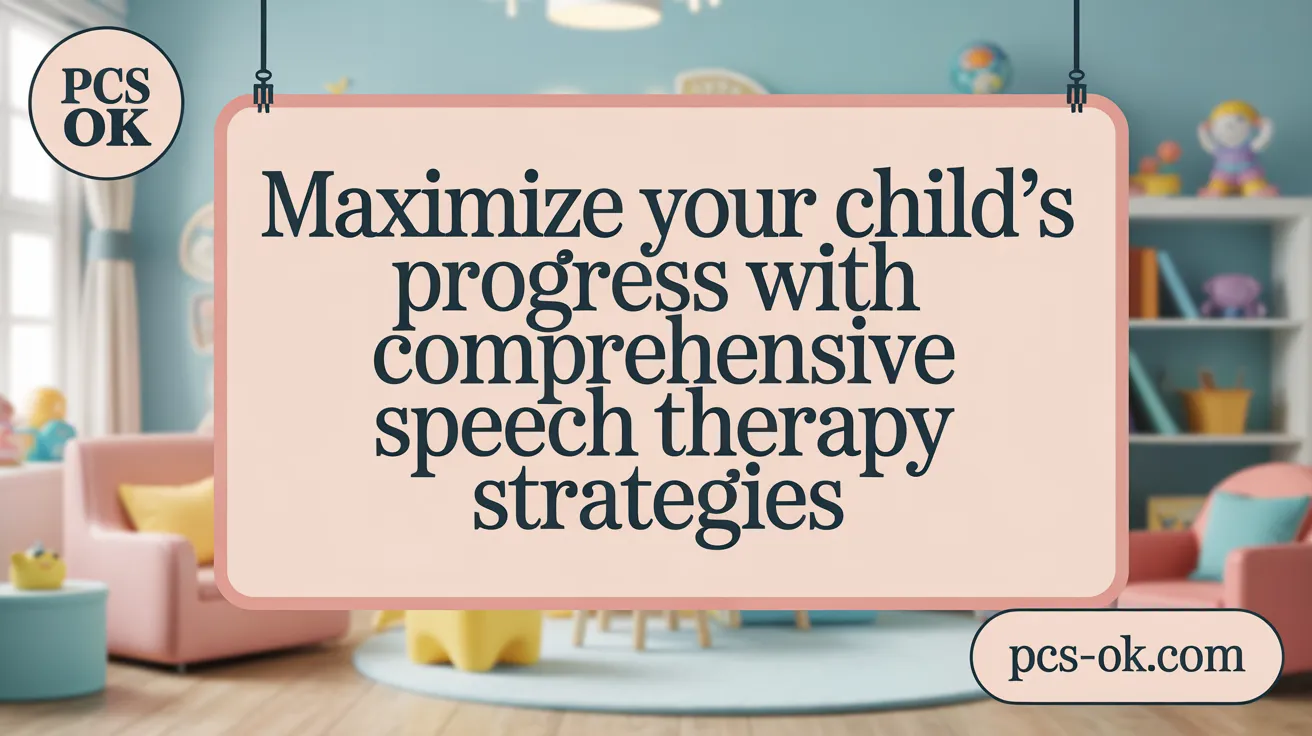
Can a child receive both private and school-based speech therapy simultaneously? What are the considerations?
Yes, children can participate in both private and school-based speech therapy at the same time. This approach allows for a more comprehensive coverage of a child’s speech and language needs, as each setting can target different goals. For instance, school therapy may focus on improving classroom communication and academic language, while private sessions might address specific disorders like Childhood Apraxia of Speech or provide more intensive interventions.
However, successful simultaneous therapy requires careful coordination. Communication between school therapists and private practitioners is essential to ensure that goals do not overlap unnecessarily and that strategies complement each other. Parents act as vital connectors, helping to align schedules and therapeutic focus.
Parents should consider several factors when deciding to combine these services. These include assessing the child’s specific needs, ensuring that therapy schedules are manageable, and understanding the associated costs, as private therapy can incur additional expenses. Balancing the child’s workload and maintaining consistency in interventions are also important for maximizing effectiveness.
In summary, combining private and school-based speech therapy can offer a balanced and extensive support system for children. When done thoughtfully, it helps address various communication challenges, promotes skill generalization across environments, and provides children with targeted interventions tailored to their unique needs.
For more information, search for “combining private and school speech therapy.”
Making the Right Speech Therapy Choice for Your Child
Selecting between private and school-based speech therapy depends on your child’s unique speech and language needs, eligibility, family preferences, and resources. School-based therapy offers valuable, curriculum-focused support at no cost but may have limitations in session intensity and personalization. Private therapy provides flexible, individualized, and often more intensive intervention with active parental involvement, though it comes at a financial cost. Many families find that a combination of both therapies optimizes outcomes. Consulting with qualified professionals and assessing your child’s specific challenges will help ensure the best path forward in supporting their communication development.
References
- School-Based Speech Therapy Vs. Private
- School-Based Speech Therapy vs. Private …
- School Based Services vs Private Practice
- The Difference Between School Speech Therapy and …
- What’s Better for my Child, School or Private Speech …
- Should I Supplement Orlando School Speech Therapy …
- Should You Supplement School Speech Therapy with …
- School SLP vs. Private SLP: Understanding the Differences
